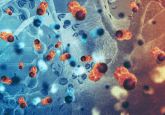Blood biomarkers may highlight the presence of drug-resistant tumor cells in prostate cancer
Researchers from the Duke Cancer Institute (NC, USA) have identified blood biomarkers possibly linked with resistance to two hormone therapies; abiraterone and enzalutamide, which are used to treat patients with metastatic castration-resistant prostate cancer (mCRPC).
Their findings, which have recently been published in the journal Clinical Cancer Research, have the potential to help direct prospective treatments and provide targets for future novel therapies.
Enzalutamide and abiraterone are two hormone treatments that prevent the activation of the male androgen receptor and decrease testosterone levels, respectively. Unfortunately, continued use of these drugs can lead to tumor resistance in mCRPC patients leading to poorer outcomes.
In this study, researchers set to identify key genetic changes in circulating tumor cells in blood that occurred during the treatment of patients with mCRPC. Concentrating on the genes that are known to be involved in cancer formation and progression, they discovered alterations in multiple genetic pathways in patients who had developed resistance to abiraterone or enzalutamide.
“We have developed a method that allows us to examine the whole genome of rare circulating cancer cells in the blood, which is unique in each patient, and which can change over time during treatment,” noted senior author Andrew Armstrong (Duke Cancer Institute).
The team isolated circulating tumor cells and matched patient leukocytes from 16 men with mCRPC. To identify the genomic changes in these cells, they conducted whole genomic copy number analysis on these isolates using array-based comparative genomic hybridization.
“Our research provides evidence supporting the ability to measure gains and losses of large scale sections of the circulating tumor cells genome in men with prostate cancer,” commented Simon Gregory (Duke Cancer Institute). “We are now evaluating this method combined with higher resolution DNA mutational studies and measurements of RNA splice variants in circulating tumor cells to determine their clinical relevance to patients and treatment resistance.”
If these findings can be confirmed with results from larger studies, the end goal is to develop a noninvasive liquid biopsy that could be used to make more informed clinical decisions.
Sources: Gupta S, Li J, Kemeny G et al. Whole genomic copy number alterations in circulating tumor cells from men with abiraterone or enzalutamide resistant metastatic castration-resistant prostate cancer. Clin. Cancer Res. (2016) doi:10.1158/1078-0432.CCR-16-1211 (Epub ahead of print); The Duke Cancer Institute press release


